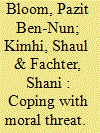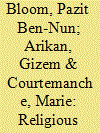| Srl | Item |
| 1 |
ID:
173770


|
|
|
|
|
| Summary/Abstract |
Moral dilemmas amid war on terrorism include repeated harsh moral choices, which often pose threats to one’s moral image. Given that people strive to view themselves as moral, how do they cope with such morally compromising decisions? We suggest and test two strategies to cope with morally threatening decision-making under in-group moral responsibility amid war on terrorism: (a) trivialization of the moral dilemma and (b) resentment toward the target. Four experimental studies measured (study 1) and manipulated (studies 2–4) these hypothesized mechanisms, presenting a similar collateral damage dilemma to Israeli Jews in the context of the 2014 Gaza conflict (studies 1 and 2) and to Americans in the context of the US campaign against Islamic State of Iraq and Syria (ISIS) (studies 3 and 4). Results demonstrate that both trivialization and resentment facilitate harsh moral choices under conditions of moral accountability. Studying the mechanism underlying moral decision-making in conflicts is key to understanding moral injury and the process of moral repair.
|
|
|
|
|
|
|
|
|
|
|
|
|
|
|
|
| 2 |
ID:
140168


|
|
|
|
|
| Summary/Abstract |
Somewhat paradoxically, numerous scholars in various disciplines have found that religion induces negative attitudes towards immigrants, while others find that it fuels feelings of compassion. We offer a framework that accounts for this discrepancy. Using two priming experiments conducted among American Catholics, Turkish Muslims, and Israeli Jews, we disentangle the role of religious social identity and religious belief, and differentiate among types of immigrants based on their ethnic and religious similarity to, or difference from, members of the host society. We find that religious social identity increases opposition to immigrants who are dissimilar to in-group members in religion or ethnicity, while religious belief engenders welcoming attitudes toward immigrants of the same religion and ethnicity, particularly among the less conservative devout. These results suggest that different elements of the religious experience exert distinct and even contrasting effects on immigration attitudes, manifested in both the citizenry's considerations of beliefs and identity and its sensitivity to cues regarding the religion of the target group.
|
|
|
|
|
|
|
|
|
|
|
|
|
|
|
|